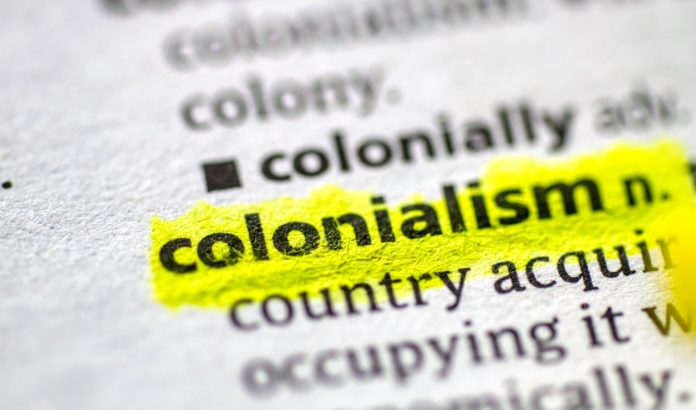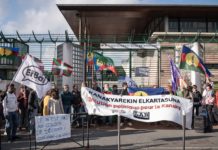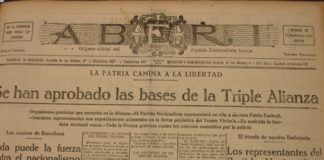The first part of the article we published, here: https://www.naziogintza.eus/en/political-dictionary-of-naziogintza-part-1/
BASQUE LANGUAGE (EUSKARA): The language of the Basque Country. Can we imagine a German who does not know German, a Spaniard who does not know Spanish, a Frenchman who does not know French? Nor can we imagine an Euskaldun who does not know Basque.
EUSKALDUN: A person who speaks the Basque language. A person who lives or strives to live through Basque, whatever their birthplace, their surnames or the color of their skin. However, the mere fact of knowing the Basque language does not make anyone euskaldun, any more than knowing English makes anyone English. In fact, we cannot consider as ‘Euskaldun’ those who know the Basque language but never speak it.
BASQUE NATIONAL AWARENESS: This consists of feeling oneself a member of the Basque nation and acting accordingly in daily practice.
DEPOLITICISATION OF BASQUE LANGUAGE: A concept outlined by those who want to neutralize our linguistic militancy. A concept that seeks our linguistic submission and to reduce our language to a simple “instrument of communication”, taking away all its symbolic and identity value.
LANGUAGE: Fundamental element of nationality. Even more so in minoritized nations. In them language is not – as the imperialists say – a simple instrument of communication, but rather the basic element that guarantees individual and collective identity. Language is the most effective weapon that oppressed nations have to prevent their assimilation.
LINGUISTIC CONFLICT: The tension existing between two languages, which ends with standardization or with linguistic substitution.
MINORITIZED LANGUAGE: A language that as a consequence of a savage colonization is left in a minority situation in a dominated nation.
LINGUISTIC IMPERIALISM: Linguistic policy that grants privileges to the language of the dominant nation and its speakers. A policy that we Basques suffer on a daily basis.
IDENTITY: Fundamental collective bond that the imperialist nations deny to the nations subjected by them. According to the dominators, the “identity discourse” of the minoritized nations is evil and perverse, a kind of racism, which must be eliminated. They know very well that when a nation is stripped of its identity its assimilation is made much easier, which is the main objective of all imperialists. Having one’s own language and culture, in particular, gives a nation its identity.
The dominant nations, however, never renounce their identity.
IMPERIALISM: A supremacist ideology that advocates that one nation has the right to subjugate others.
COLONIZATION: Process by which a nation, linked to an imperialist idea, appropriates the material goods of another nation, and strives to eliminate its language, culture and collective identity, by means of a process of foreignization making it appear ‘foreign’. The basis of colonization is to subjugate a nation by imposing a foreign domination upon it. Colonization extends to all areas of human activity: economic, social, demographic, cultural and political.
COLONY: A nation that is colonized, under the control of a foreign state. This nation does not have to be thousands of kilometers away from the metropolis, as advocated by the supporters of the “salt water” principle (according to them, to be a colony there must be an ocean between the colony and the metropolis). Better than rhetorical arguments, an empirical observation describes very well what a colony is: “when the army, the police and the judicial system in your country do not speak your language, you live in a colonized nation“.
A COLONIZED: A person who has been assimilated by the oppressor state. A person who, consciously or unconsciously, has made the language, culture, customs and thinking of the dominant state his own.
SETTLER: Fundamental tool (involuntary, in most cases) of the assimilationist project of the dominant state, who migrates from the metropolis to the dominated nation. Settlers are key elements of colonization. It is a reversible category: an individual ceases to be a settler when he integrates into the host nation.
CULTURAL DIVERSITY: Political stance in favour of coexistence between people of different origins and cultures, which never threatens the languages and cultures of sovereign states.
Nowadays, all societies in the West are diverse and multicultural. France and Spain are diverse, and this has no influence whatsoever on their languages or their national identity, because this diversity is integrated into Spanishness or Frenchness. Diversity is associated with respect: whites-blacks, natives and foreigners, Christians-Muslims, feminists, LGBT groups… they are all Spanish or French.
In the dominated nation, on the other hand, the word ‘diversity’ is used to oppress the oppressed nations even more, to the point of turning us Basques, in our own home, into a sad ethnic subgroup: ‘diversity’makes us all, Basque speakers and non-Basque speakers alike, Spanish and French. Diversity is invoked to proclaim that in the Basque Country one has the right not to speak Basque. In Spain or France, on the other hand, diversity is no excuse for not speaking their language.
LEGALITY: Space for coexistence imposed by the set of laws of a state. The laws that make up legality do not always have to be fair. For example, slavery was legal in the USA, and apartheid in South Africa.
It is established power that ultimately makes the law.
LEGITIMACY: A concept that goes beyond the legal framework, and also takes into account ethical and moral reasons. Not everything that is legal is legitimate, and all that is legitimate may not be legal. The legitimacy of certain actions goes beyond compliance with the law, especially when these actions affect individual and collective rights.
NATION: A set of individuals of the same ethnic group who are politically aware of their identity. The nation is not a state, but an ethnic community that wants to be a state. Our nation: Euskal Herria (The Basque Country).
NATIONAL BUILDING: A set of policies aimed at strengthening the identity of a nation and awakening the national awareness of its citizens.
NATIONALISM: A political ideology that maintains that a nation has the right to be recognized as such (national recognition) and to be on the same level as the other nations of the world. Unlike imperialism, nationalism does not aspire to subjugate other nations, because it is not linked to a supremacist idea. Nationalism wants “to be”, while imperialism wants “to have”.
BANAL NATIONALISM: A concept linked to the normalising force of states. Although it does not have to be proclaimed explicitly, state nationalism has a strong influence on society, which is not questioned. It appears in symbols, in sport, in the way we speak. For example, when we define a product manufactured in Zaragoza (Spain) as national; when we refer to the government, we automatically understand Spanish or French; when we call someone from Seville (Spain) autochthonous, and one from Urruña (The North Basque Country) foreign, etc.
The adjective “banal” does not diminish the importance of this kind of nationalism, but on the contrary: it is a typical feature of our society, so ingrained that we are not even aware of it, and yet we are impregnated with this banal nationalism.
LINGUISTIC NORMALIZATION: To be able to live in the Basque Country through the Basque language, without stress and without having to think about the language, because the Basque language comes up automatically in relationships: in the same way that in Germany one lives through German.
CIVIL OBEDIENCE: The position of the one who submissively obeys the oppressor state, the one who accepts the authority of the oppressor state. The position of the one who complies with the oppressor’s legality. In our geo-political context, the most effective weapon to carry out our national destruction to the end.
LINGUISTIC SUBSTITUTION: In minoritized nations, this is the name given to the process of the disappearance of the indigenous language and its replacement by the language of the dominator. Language substitution is a consequence of colonisation. Bilingualism is an intermediate, provisional stage of linguistic substitution, which always ends with the total hegemony of the language of the colonising nation.








